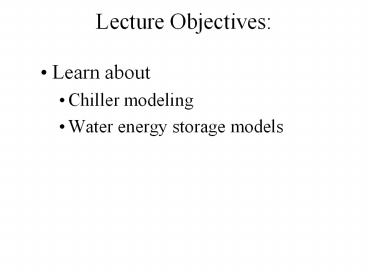Lecture Objectives: - PowerPoint PPT Presentation
Title:
Lecture Objectives:
Description:
Title: Slide 1 Author: Jeffrey Siegel Last modified by: CFDprc1 Created Date: 8/16/2002 11:00:28 PM Document presentation format: On-screen Show (4:3) – PowerPoint PPT presentation
Number of Views:27
Avg rating:3.0/5.0
Title: Lecture Objectives:
1
Lecture Objectives
- Learn about
- Chiller modeling
- Water energy storage models
2
Modeling of Water Cooled Chiller
(COPQcooling/Pelectric)
Chiller model
COP f(TCWS , TCTS , Qcooling , chiller
properties)
3
Modeling of Water Cooled Chiller
Chiller model
Chiller data QNOMINAL nominal cooling
power, PNOMINAL electric consumption for
QNOMINAL
Available capacity as function of evaporator and
condenser temperature
Cooling water supply
Cooling tower supply
Full load efficiency as function of condenser and
evaporator temperature
Efficiency as function of percentage of load
Part load
The consumed electric power KW under any
condition of load
The coefiecnt of performance under any condition
Reading http//apps1.eere.energy.gov/buildings/en
ergyplus/pdfs/engineeringreference.pdf page 597.
4
Combining Chiller and Cooling Tower Models
Function of TCTS
3 equations from previous slide
Add your equation for TCTS
? 4 equation with 4 unknowns (you will need to
calculate R based on water flow in the cooling
tower loop)
5
Merging Two Models
Temperature difference R TCTR -TCTS
Model
Link between the chiller and tower models is the
Q released on the condenser Q condenser
Qcooling Pcompressor ) - First law of
Thermodynamics
Q condenser (mcp)water form tower (TCTR-TCTS)
m cooling tower is given - property
of a tower TCTR TCTS - Q condenser /
(mcp)water
Finally Find P(?) or The only fixed variable
is TCWS 5C (38F) and Pnominal and Qnominal for
a chiller (defined in nominal operation
condition TCST and TCSW) Based on Q(?) and WBT
you can find P(?) and COP(?).
6
Low Order Building Modeling
Measured data or Detailed modeling Find Q(?)
f (DBT)
7
For HW3a (variable sped pump efficiency) you will
need Q(?)
Yearly based analysis You will need Q(?) for
365 days x 24 hours Use simple molded below and
the Syracuse, NY TMY weather file posted in the
course handout section
TMY 3 for Syracuse, NY http//rredc.nrel.gov/sola
r/old_data/nsrdb/1991-2005/tmy3/by_state_and_city.
html
8
For Austins Office Building
Model (Area 125,000sf)
Hours in a year
kW
Used for component capacity analysis
Model
0 when building is off
Number of hours
Reading assignment http//www.taylor-engineering
.com/downloads/cooltools/EDR_DesignGuidelines_Cool
ToolsChilledWater.pdf Chapter 2
9
Modeling of chilled water tank(stratified vs.
mixing)
To chiller
From building
Stratification
To building
From chiller
Mixing happens if the supply temperature vary
Mixing model mcpDT/D? ?? Qin ?? Qout
10
Stratification
Dr. Jing Songs PhD results
Flow time at 20 minutes
CFD domain
Flow time at 1 minute
11
Stratified model(simplified)
However even if the chiller supply constant T the
return water from building is not constant!
From building
To chiller
T1
T2
Building
Building
T3
Tn
To building
From chiller
For a constant T supply it is a very simple
model
chiller
chiller
Model details in Solar Engineering of Thermal
Process
12
Tank model
Flow indicator
Building
Building
Flow for each node
Energy balance
chiller
chiller
13
HW 4
Model a Chiller coupled with the Cooling Tower
(from HW3) and plumbing and pump System from HW3
for the building in Syracuse (from HW3) Chiller
model coefficients Provided in the
Handout section of the course website































